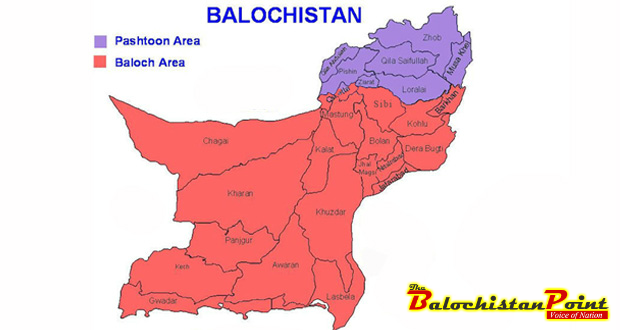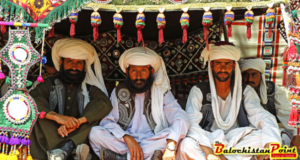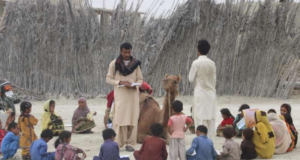By: Sadia Sohail
THE case study of Balochistan reveals many important horizons need to be discovered. The general phenomenon upholding till date by our old and current generation is the issue of separatist movement going on in Balochistan. However, unfortunately nothing had ever been taken into account by the researchers/analysts to explore and disclose the causes of this sustained agony. If we meet common folks belonging to Punjab, Sindh or KPK, they would be complaining about Baloch’s inadequate and superfluous behaviour towards Pakistan’s government. This needs to be investigated before giving a hard or harsh narrative.
From Pakistan’s inception till date, this province hasn’t been given equal rights. Lack of infrastructure and development led tribal lords to play their cards well. People of Balochistan while remained ignorant of their due rights, have now become puppets in the hands of tribal lords and enemy states. By getting the facts right, there is no denial that India played a central role in 1971 war in dividing Pakistan through propaganda and by accelerating and catalyzing anti-Pakistan movement in the erstwhile East Pakistan. However, our government’s imprudent policies to manage this insurgency in the 1970s are till date a stigma on the history of Pakistan. The story in Baluchistan is taking shape, more or less, in a similar way to the East Pakistan.
However, a number of players had increased with the increase in their interests in Baluchistan. Other than political goals, there are many strategic goals underlying for India to interfere in the matters of Balochistan. An unstable Pakistan is in India’s interest. Other than that Baluchistan’s rich mineral and gold resources have now become an open secret to the international community. By losing Baluchistan, Pakistan would not only lose its part located at an important geopolitical location but also its natural resources.
Once I read somewhere that oil has become more a curse for the Middle East region than a blessing. The argument in support of this statement derived from international scholars, signifying that the presence of major oil reserves in the Middle East attracted the US and Europe to play their dirty politics in this region. Today what we are witnessing in the Middle East is the result of an aim to capture its large amount of oil reserves. However, a pursuit of democracy is used as an instrument to invade these states. West believes that, monarchs and dictatorship in the states of Middle East has taken away the right of self-determination from its people. To restore this believe, they are intervening in these states to establish peace in the name of human intervention.
Politics is at play in major parts of the world. There are many human rights violations occurring in parts of the world. But international community is not concerned with human rights violations.. States like the US, Russia and others invade only those states which are rich in resources. So, is the case with Balochistan.
Baluchistan has become an epicenter of international attention, fortunately or unfortunately due to its largest reserves of copper and gold. Other than that, many oil and gas pipelines pass through it. This region is highly volatile to Pakistan’s interests. Its instability is the greatest challenge which requires a systematic resolution. A policy made in a hurry could produce heinous results. A step by step systematic approach is needed to produce an environment of peace and stability in this region. There is also need to develop relations with neighboring states sharing borders with Baluchistan because stability could only be established, if its borders are well monitored and secured. We cannot ignore the fact that Iran is a major stakeholder in our foreign policy, and it becomes more important when we know that future of many international pipelines is highly dependent on our good relations with Iran.
India is another border country and is taking advantage of the situation. Pakistan needs to adopt prudent policies, not only to improve security situation in Baluchistan but also because it is the gateway to improve our unimpeded trade growth. These gridlocks have largely hurt Pakistan’s economic interests. By improving relations with Iran, we can have multiple advantages at our end. First, it will improve the security situation in Baluchistan and will help in its development. Second, it will boost confidence building measures among Balochs and government of Pakistan and government of Pakistan can initiate its long promised pipelines through Iran. Whereas India is concerned, India is also eyeing the benefits of TAPI and IPI to fill its thirst for energy resources. While eyeing on its rich oil and gas resources, and an aim to destabilize and cripple Pakistan by separating Baluchistan from Pakistan, India has resumed many insurgent operations in Baluchistan. India’s covert operations are not hidden anymore. The declaration of Indian spies of sabotaging Baluchistan through suicide bombing and facilitating small arms manoeuvring across the borders is now an open secret.
At this hour, government of Pakistan should move forward with a better narrative to bring improvement in Baluchistan. The situation in Baluchistan needs a policy plan which brings amelioration economically, strategically and socially. A strong Baluchistan can promise a strong Pakistan. We should unite as a nation to safeguard our national interests in Baluchistan and abandon every possible interference from Indian or western side through strong plan of action. For that government of Pakistan needs to develop its health and education department first. It’s not important that mega projects should be launched, but rather small steps towards infrastructure development in health and education department could lead us to cover miles of restoring confidence and trust upon each other. A decision made in time saves nine. Courtesy: Pak Observer
— The writer is freelance columnist based in Islamabad.
Email: sadia.sohail1@hotmail.com
Published in The Balochistan Point on April 15, 2017
 Balochistan Point Voice of Nation
Balochistan Point Voice of Nation




